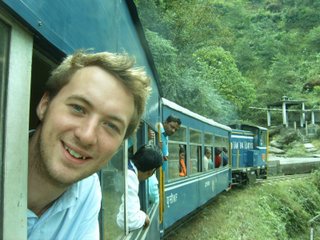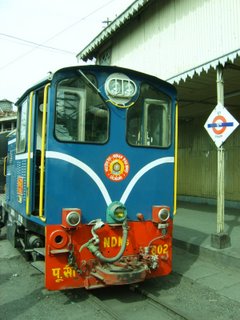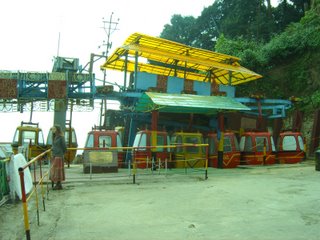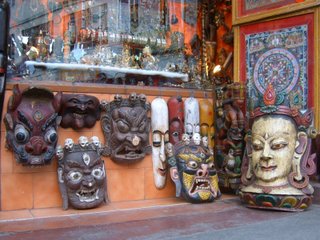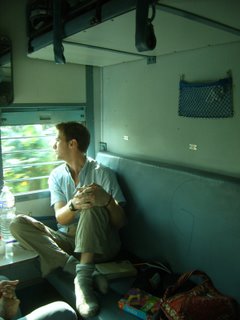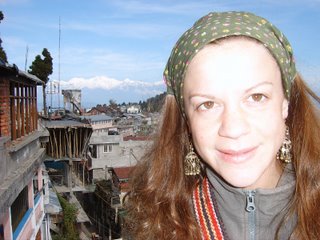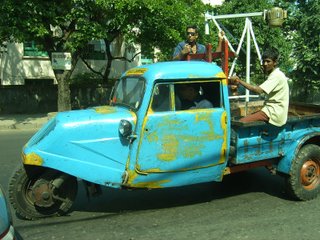When we lived in Mahdyamgram, 16km out of the centre of the city, life was very different. Though there was still an overwhelming quantity of people dashing around in a typically mad manner, they didn't tend to approach you or clamour for your attention. Rather, they would be rather startled by, or curious at, the appearance of a white face in their tourist-less little suburb. Occasionally a man might, after a lengthy ogle, find it too much to resist and shuffle over to ask us where we're from, or if we liked Frank Lampard, or how we'd found India so far- but these conversational efforts were amusing, endearing and were mostly innocent of any underlying agenda besides the polishing of the person's english. Besides, they broke the awkwardness of feeling like a curious, stick-poked freak and offered an olive branch of inclusion to make us appear nominally welcome or at least human.
The area also, depite heavy development, retained a sense of the countryside. This was, I think, mainly suggested by the occasional lily-topped pool of stagnant water but the silence at night certainly had a rural feel.
So when we moved to the very centre of Kolkata, things, as we knew they inevitably would, altered somewhat.
Our hotel was one of a quarter-mile row's worth of budget backpacker accommodation on Sudder Street, a street which held what must have been at least 80% of the tourist population of the city and hence was the very heart of the tourist enclave.Tourist enclaves the world over invariably prove a draw to loitering touts and hawkers of every kind with their teeming streets of fat-walleted Westerners and Kolkata, one of the poorest places on the planet, is certainly no exception.
It must be, to the more penurious city-dwellers, as alluring as the promise of panning for gold- only in this case the the river is substituted for a ceaseless flow of bemused and ambling visitors and the act of panning becomes the act of persistently offering whatever you provide (though the two must be equivalently tedious). The gleaming nuggets that may emerge after a day and a night's worth of hammering out the words, "rickshaw, sir?", "banana an-tee?" or (the most absurd we've yet heard) "doormat, madam?", might just make the effort worthwhile.
When we first negotiated these eager invitations, we appeased each in turn with an apologetic smile; an embarrased titter followed by a demure "no thank you"; or, to the very persistent, a "when I get back?". We empathised with this often grubby and bedraggled mob, we imagined how hard it must be to eke out a living in a city so over-crowded and unforgiving and felt that affording them a respectful response went some way to dignifying their desperate offers.
After three weeks of fielding this relentless and indiscriminate barrage however, we became as curt and dismissive as every other Kolkatan and, incidentally, it made not a blind bit of difference. It's arrogant to assume, patronising even, to think that your smiles or your consoling shoulder-pats are doing anything but assuaging the guilt that you feel at being born into relative privelege. Added to which, Indian social mores in cities such as Kolkata are different to our own. Ignoring people isn't regarded as rude, it's simply an alternative to taking notice. It's understandable- if you didn't ignore these continual thrusts, you'd be worn to the bone by attentive refusals and be incapable of thinking, seeing or doing anything else.
Some, of course, don't even go to the trouble of offering anything and simply ask you directly for money. Begging is, from what we've so far seen and read, a veritable vocation in India. Stories of children being hired out for the day to elicit greater sympathy; limbs and fingers being removed to increase the appearance of desperation; practising pained expressions or limp, pathetic lethargy to draw the rupees more effectively- all, apparently, have been applied in the past and our evening strolls seem sometimes to confirm their truth.
Indians are generally generous when it comes to donating, especially to the elderly as they receive no state support, and particularly around the puja (festival) times when people are cajoled into giving more than usual by their religious obligations. One particular pair we saw were marvellously teamed up. One of them, a short man with a painful-looking hobble, wore a plain white ankle-length robe and held a candle in front of his theatrically worn and weary face. In his other hand he dragged a length of rope, no longer than a few feet, that was attatched to a structure much like a wooden pallet on coasters. Upon this sort of cart was what I believe is known as a 'pillow man' (a dreadfully unfortunate fellow without legs or arms) who was propped up against an upright board. He too held a candle beneath his face which was contorted into an expression of great, gawping pain. Around his body were countless unfurled bank notes and a pool of glimmering silver, chiming and rippling with each new toss from the passing crowd.
Now you musn't think me a heartless cynic- it was a shocking and deeply saddening sight. But on further inspection, there seemed to be something rather contrived and artful about the pace, lighting, expressions and the lack of interaction with the crowd- as if they were walking through an underworld concealed from human eyes. It looked like an extremely well-rehearsed but slightly hammy performance.
I can imagine this must sound appaling to some people so let me reiterate. To be without limbs is, unquestionably, an inconceivably awful affliction. But it has to be remembered that there are a massive amount of people in Kolkata who are in similarly diabolical straits, have no grounds for ambition besides begging and will look at these two as being the luckiest buggers in the begging trade. The pillow man's deformity evidently benefits the otherwise unappealing white-robed man and in return the white-robed man cares for the pillow man. It is a peculiar but effective partnership.
For example, if you imagined a desperately destitute, squat, ugly, middle-aged woman who has no home, no money, no opportunity of marrying, will never have a legitimate means of making a living and is unlikely to be a profitable prostitute, is without the 'aid' of children and who has all her limbs in place- she'd be a useless draw. Might she just look to the money-laden pair and covet their ability to secure big sums of cash? I couldn't possibly say for certain but it's not impossible.
Anyway, besides the touting and the hawking and the begging and the array of aggressively darting vehicles that roar and honk and squeal and clank is the smell.
Before I arrived, my friend Giles (hello Giles) who had been to Delhi a few years ago described something I'd read and heard from countless sources: that the first and lasting impression of India (mainly cities) as you step out of the plane was the sweet smell of faeces. As my time came to disembark and I made my first tentative step into Indian air, I attempted a few exploratory sniffs and was pleasantly surprised to find that all their warnings didn't apply. That was, however, until we reached central Kolkata's grimy and litter-strewn streets.
In a city of 14 million, it must be a tsunami-like struggle for the state to maintain even a moderate level of cleanliness. But some Kolkatan men seem, if anything, determined to make this struggle into a practical impossibility.
Often, when we passed through streets in the first few days, we'd notice saronged men crouched down, perched over the gutter, facing the wall. We'd seen similar at Sealdah station: people hunched surreptitiously over their carefully prepared foil and blackened glass pipes preparing a smoke of some sort and assumed that they must be engaged in the same.
That was until one day when, at a distance, we started at the sight of a similarly crouched man who, through the gap of his stretched sarong around his squatting thighs, was casually spurting a thin stream into the gutter. I, prudish Englishman that I am, felt as if I'd caught him in the act and that perhaps I should turn away to let him finish the job. We continued past him however and he remained utterly unfazed.
We encountered the sight again and again and each time I felt a renewed sense of...disappointment, I suppose. That grown men should so inconsiderately piss wherever and whenever they felt the urge. It seemed childish: the sort of thing you'd expect to see from a three-year old boy, his trousers round his ankles, gawping vacantly at his mother as he lets fly over the garden wall.
I can feel the burn of hypocrisy as I recount the times I've drunkenly stumbled into a dark corner to urgently relieve myself but I must state that it's one thing to find discreet spots in the dead of night when left with no immediate alternative and another to just wantonly slash on a busy public street in broad daylight.
To further compound the irresponsibility of some, you often find men squatted opposite or even next to designated urinals. Not that these offer much respite from the sight or smell as they're little more than three chest-high walls, two bricks on which to stand and a mouse-hole at the base of the wall that you face, through which the effluent flows into a litter-blocked gutter. In fact, if anything, they serve to concentrate the stench of ammonia to the point where it actually stings your eyes as you pass and, if you can hold your breath long enough (god help you) you can see where the build-up of bacteria has created an expansive film of furry yellow. This was most true of the alley on which our hotel was located as opposite the main entrance, a mere ten feet away, was the fuzziest, foulest smelling piss-hole of the lot.
So, in future, if ever I have the good fortune to find myself in a pub toilet or a public convenience, I'll breathe deeply and think fondly of Dear Old Kolkata.
The added olfactory offence was the city air itself. Besides the thick, black emissions from numerous beaten up old buses and the plague-like proportions of auto-rickshaws, the ubiquitous and endearingly ancient Ambassadors that must make up at least two thirds of the city's traffic spout forth the most repulsively soupy, particle-rich fumes of the kind it's possible to only distantly remember from the pre-catalytic converter days in which we hadn't quite acquired an environmental conscience. If ever you've had the pleasure of cycling along London's double-decker crammed Oxford St on a stifling summer's day, you can probably imagine the sort of suffocating fug that comprises the majority of Kolkata's breathable air.
So, if we can draw all these threads together- the chaotic sight and sound of the rapid, tooting traffic that aggressively fires in from every angle; the masses of hawkers and beggars calling to and accosting you with desperate pleas and promises; the asphyxiating stench of fumes punctuated by the occasional slap of a piss-hole's stink- I think it's not too melodramatic to suggest that each journey to and from the hotel was a little like 'going over the top': "Clap your tin hat to your head and run like the devil man! Hope to god you don't get hit!" As you take a deep breath and bound out of the door, a sustained sensorial assault is launched: all around are explosions of 'TAXI!' 'Rickshaw!' 'HELLO!' 'Milk for baby!' throwing you from one side of the street to the other whilst weaving through darting carts, bicycles and honking cars- taking a breath for a moment down a side street seems sensible, before the first breath beside an unseen urinal renders your nostril hairs irreparably singed, your eyes watering and your lungs hacking and off! Back into the fray!
From our now peaceful perspective, high up in the Himalayan hill town of Darjeeling, Kolkata seems a damnable place to live, even for as brief a stay as ours. I can't stand cities at the best of times- an afternoons' shopping in Norwich can often send me into a spiral of despair. They seem to me to offer little in the way of attraction. They appear, the world over, to be breeding grounds for cynicism and mistrust, envy and deceit, poverty and depression. They're cramped, foul-smelling, expensive, difficult to negotiate and make even the best connected feel anonymous and insignificant. They stifle the diversity of the region in which their built and replace it with a homogeny of concrete and advertising billboards. They are, in essence, unnatural environments and I think the greatest evidence I have seen of this is in London (and any city, I imagine) in the summer: every patch of green serves as a fly-paper for humans- the merest suggestion of the natural world, even if comically tiny and neighboured by a noisy street full of belching engines, is emphatically snatched.
Kolkata is the epitome of cities.
So we are, as you may have noticed from the sneaky insert above, now 600km from Kolkata and perched on the slopes of the Himalayan foothills in the famous tea-producing town of Darjeeling (elevation 2200m). We've been here for a day now and have made no effort to conceal our excitement and wonder at being able to hear the tock of our clock as we drop off to sleep; of seeing massive expanses of uncluttered green; of (we realised only yesterday) seeing the deep, rich blue of the sky for the first time since we arrived; and, most of all, having our first appetite-whetting peek of the mighty Himalaya. Kanchenjunga, which offers the third highest summit in the world, is, clouds permitting, visible from our hotel roof.
In one week, we shall be in Kathmandu and organising our trek to follow inthe footsteps of Edmund Hillary's successful 1953 ascent (or at least the bit up until the bottom of Everest).



